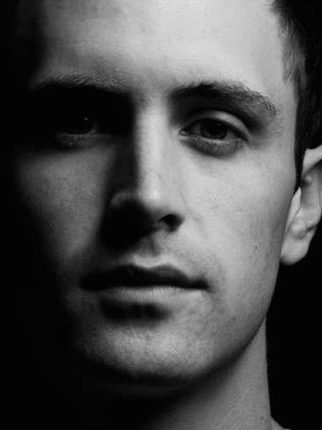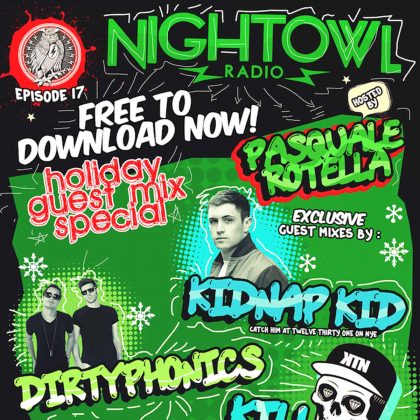Kidnap Kid Might Be 24, but He’s No Overnight Success Story
Kidnap Kid has moved from success to success over the last three years. Signing in 2012 to one of house music’s most respected labels, Black Butter, he made his debut there with “Vehl.” In a sea of EDM, his music managed to strike a chord with American audiences—so much that he earned the US iTunes “Best Electronic Song of 2012.” He is part of a charge to take the groovier side of house music and put it back on the mainstage, where it belongs.
“I would cycle 20 miles to get to the party because it was way outside the city to go the warehouses and play. I would actually DJ anywhere I could.”
It’s hard to believe that the 24-year-old can almost be called a seasoned vet of the scene. With 10 years behind the decks, and almost as much time producing, he is no overnight success story. In fact, while house music is where he found his home, his first love was drum & bass. How does a young raver go from roaming the English countryside on his bike, spinning D&B at renegades, to stepping out in front as one of deep house’s leading artists? I got the chance to find out when I met up with him recently.
You are pretty young to have achieved so much success, but you’ve been around electronic music for a long time. How old were you when you first started going to raves?
I was 14 when I first started DJing.
And you were into drum & bass at first, right?
Yeah, that was it. I love jungle; that was the thing that got me hooked. Where I grew up in the North of the UK, there were a lot of parties in the woods. I would go and DJ there.
So, you grew up on renegades?
Yeah.
Were you DJing frequently then?
As much as I could, really. I had my bike with panniers. I would stuff them with records, and I would cycle 20 miles to get to the party because it was way outside the city to go the warehouses and play. I would actually DJ anywhere I could.
Did your parents know what you were doing?
Yeah, they both played a lot of music, so they were great.
And they are both musicians as well?
Not professionally, but they both play a bit. They were just fully supportive of me playing music, really.
What do your parents play?
My dad plays guitar, and my mum, she was a music teacher. I foolishly never got lessons; it was such a wasted opportunity. She was a piano teacher, and she taught the flute as well. She could play a bit of everything. There were always instruments around the house.
How quickly did you get into production after DJing?
I probably DJd for about two years before I started playing around with production; it was just a natural progression. My friend gave me some cracked software, and I got hooked on it and have been producing every day since then, basically.
What were you producing then?
I started off making drum & bass, because that’s what I was playing then—although I don’t know where all those files went. There’s a hard drive of some fucking terrible music out there. If I ever find it, I’ll probably burn it.
So, you started off as a drum & bass DJ, and it’s been 10 years since then. How did you end up on almost the opposite side of the electronic music spectrum?
I don’t know. I still love it. Maybe I’ve gotten a little older and I just like the slower stuff. I guess it was a slow progression. Maybe like five years ago, I got really into UK garage, which is more like the house tempo, it’s like a gateway drug toward house music. I kind of got used to that tempo, and then I started to like the more relaxed, musical stuff.
You’ve played a lot in the US, and the States are awash with EDM. Why do you think your music is so successful here?
I honestly don’t know. Really more so than in the UK, they have really taken to it out here, which is really great. It’s like people are looking for an alternative. I don’t know why me over someone else. I try to keep things musical so it appeals to people who may not be dance music fans.
Do you find yourself with a lot of fans that are outside of electronic music?
Yeah, I do get a lot of people hitting me up, who say: “Now I really love house music, but that wasn’t always the case. I listened to a few of your tracks, and that is what started it.” They feel like they can get into it, and then they sort of end up loving it all. I’ve heard that story a few times.
Do you still listen to drum & bass?
I do, in a sort of nostalgic way. I don’t keep up with it by buying new releases. I still have hundreds and hundreds of records I was playing at the time, so I still listen to those at home. I’m still listening to the stuff I would find years ago.
Who were your favorite artists?
I loved the real percussive stuff, so the stuff that was coming out on Renegade Hardware was great. I love Spor and Noisia—the real crazy, tear-out stuff. But then I love Alix Perez and Goldie.
You have a long career ahead of you; do have any thoughts of venturing outside of electronic music?
Who knows. The difference now from what I was doing 10 years ago is so vast that it is so hard to say what I’ll be doing the same amount of time in the future. I think for now, I love the whole electronic music thing. One of the things I fell in love with, besides the music, is the whole community aspect of it. The whole DIY underground side of it was what really enticed me as a teenager. I found it very, very cool, and that’s a part of it that I still really like. So, I don’t think I’ll leave the electronic side any time soon. It’s what I’ve always loved. I may get a bit more experimental and a bit more live. I want to keep it more firmly rooted in a club rather than an evening show.
You have a degree in crime and politics. Do you find that you view electronic music’s political side through that lens?
I guess I do, subconsciously. You come away from studying something like that, and I look at life with a certain lens now. I’ve never really sat down and thought about how the two are joined. It must have an effect on my thought process, I’m sure. There is a certain political aspect to the whole scene.
Are you still heavily into politics?
Massively. It’s a kind of side theme in my life—UK stuff, of course.
Do you think you would ever use your recognition as a platform to say anything political, or do you want to keep the two separate?
I don’t want to keep the two separate. But I do because, I think, of bad judgment. I’ll occasionally drop my guard and go on a political rant, but people aren’t interested. People come to musicians as an escape from all that shit. So I think it’s best to keep them separate. You know, if you get on a really big platform, I think it’s best to use it to do good in the world. But I think I’ll keep my personal political views separate.
So, maybe to do something positive and proactive in that way?
Using it for good, exactly that. There’s a new project I’m getting involved in. An old friend of mine is setting up a label and has got his hand on some really old African recordings from like 50 years ago. We plan to rework them into all these really modern pieces of dance music, and then all the money generated from it would be heading back to Africa next year to build schools. I’m trying to do positive things with my music in that sense, and less political arguing. I’ll save that for the dinner table with my friends.
Follow Kidnap Kid on Facebook | Twitter





